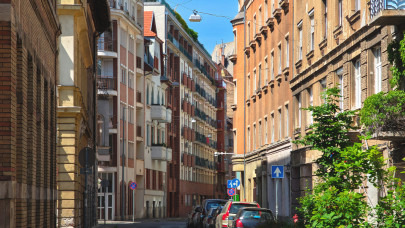And underlining the fact that this is a fair where people come to do business, the farmer never returns to Ukraine empty-handed. In 2013 he arrived home with sales contracts signed at Agritechnica for a Deutz-Fahr Agroton 620 tractor, a Horsch drill and a six-furrow Kverneland plow.
It began with seven hectares
Smolniuk's agricultural enterprise, called Demetra, began in 2000 and is based in the village of Stepove, not far from Dnipropetrovsk, one of the Ukraine's largest regional centers, which is about 400 kilometres south-east of the country's capital, Kyiv. A steelworker by profession, although he then sold truck and tractor tires before beginning to farm, Smolniuk's business started in a small way thanks to land reforms in the country that saw his parents get seven hectares of land, where they planted vegetables.
He told Ukraine's Agroexpert magazine that in the first year they achieved a very good harvest, producing 100 tonnes of tomatoes per hectare.
“It awakened our interest more,” he says. “The next year we expanded to 20 hectares, which then became 150 hectares. Every year we have leased more and more land.”
Highest sunflower yield in Ukraine
Today the farm has a total of 1000 hectares of its own land, and manages another 1000 hectares under contract in the local area. Smolniuk grows corn, wheat, barley, sunflowers and vegetables. His favorite crops are sunflowers and beetroot.
"Sunflowers bring good profits, and growing beetroot is fun for me," he says, and indeed the 5.1 tonnes/hectare of sunflower seeds achieved last year was not only the best yield in the Dnipropetrovsk region, but throughout Ukraine.
And he achieved good results in other crops too. His average yield for corn was 6.6 tonnes/hectare – even reaching 12 tonnes/hectare on some fields – and for barley the average was 5.5 tonnes/hectare.
Demetra has its own grain storage facilities where the harvest can be kept for a longer period, meaning that Smolniuk can choose when he sells his crops to get a better price.
Fields under experimental drip irrigation
Dnipropetrovsk region suffers from a lack of rainfall, getting only 30 to 40 centimeters of rain annually. Therefore, Smolniuk often irrigates his fields of corn and vegetables. At Agritechnica 2013 he also bought an Italian sprinkler system, and this year he has been irrigating trial plots with maize and sunflower hybrids. The farm business has good black soil and currently 80% of it is plowed each year, with the other 20% under minimal cultivation and only worked with a subsoiler.
“I work the land with various systems, even no-till, but for my soil the plow is better and I get higher returns," he says.
This year Smolniuk is expanding into seed multiplication as a new line of activity. He already has all the necessary documents and certificates, and is planning to start producing wheat, barley and peas for a German seed company that he has been working with for several years.
Young staff
Smolniuk's farming operation employs a total of 10 people.
"Our office employees are 26-years old on average, and field personnel 38 to 40 years,” he says. “For example, our agronomist, Yana Simonova, is only 19-years old, and found her position at Demetra on a job board.
“I'm convinced that we need to produce and educate a good employees,” says Smolniuk.
Experience from abroad important
It is clear that Gennadii Smolniuk likes to build on his experience through foreign travel.
"I have been almost everywhere in Europe,” he says, adding that he has spent a month in Holland visiting vegetable farms, and regularly visits Germany to meet with seed company Saaten Union.
“I was also in Spain to see sunflower breeding establishment, and have also got to know the agricultural sector in the Canary Islands.”
This year Smolniuk will visit Agritechnica again, along with a group of Ukrainian farmers. His shopping list for the fair has already been fixed. It includes: a four-furrow plow; an eight-meter cultivator; a drill from Väderstad, Maschio Gaspardo or John Deere; and a compact disc harrow.
Agriculture in Ukraine
According to Iryna Korchagina of Agroexpert, the 43 million hectares of agricultural land in Ukraine represents almost 70% of the total area of the country.
She reports that figures from the Ukrainian Agribusiness Club (UCAB) suggest this supports 45,000 arable farms, with 67.3% of them cultivating up to 100 hectares; 15.8% with 100 to 500 hectares; 5.6% with 50 to 1000 hectares; 5.4% managing from 1000 to 2000 hectares; and a further 5.9% with more than 2000 hectares.
A feature of Ukrainian agriculture are the so-called agricultural “Holdings”, where several smaller businesses work together to farm thousands of hectares. There are currently 80 of these cultivating more than 10 million hectares, and the largest is Ukrlandfarming that has a total of 650,000 hectares of arable land including egg production. The second-largest is NCH Capital (New Century Holding) with 450,000 ha and specializing in grain production. The third-largest is Kernel with 400,000 ha with focus sunflower oil and grain.
Agricultural land in Ukraine may only be leased at the moment as there is a ban on land sales until the end of 2015, and there are no area-based subsidies paid to farmers in the country.
Since the start of Ukraine's political crisis two years ago, the demand for new agricultural machinery in the country has reduced by half, according to the UCAB. Farmers are either buying cheaper technology from Asian or CIS countries, or waiting until the economic situation in the country improves.
There has been a growing interest in second-hand agricultural machinery among Ukrainian farmers generally. This is a new development as traditionally it was only the smaller farmers in the country who would buy used machines due to their limited financial options.
More information for international visitors considering a visit to Agritechnica 2015 can be found at: www.agritechnica.com







